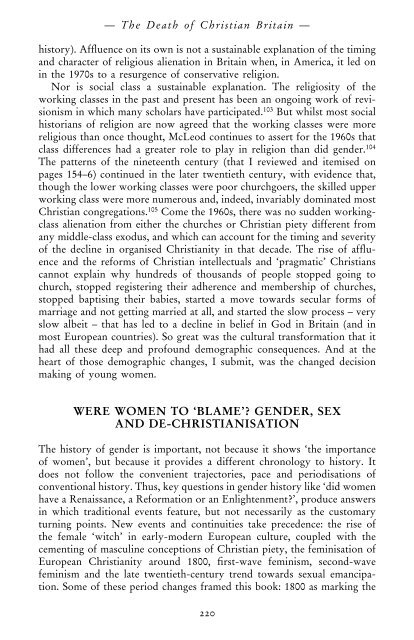The Death of Christian Britain
The Death of Christian Britain
The Death of Christian Britain
Create successful ePaper yourself
Turn your PDF publications into a flip-book with our unique Google optimized e-Paper software.
— <strong>The</strong> <strong>Death</strong> <strong>of</strong> <strong>Christian</strong> <strong>Britain</strong> —<br />
history). Affluence on its own is not a sustainable explanation <strong>of</strong> the timing<br />
and character <strong>of</strong> religious alienation in <strong>Britain</strong> when, in America, it led on<br />
in the 1970s to a resurgence <strong>of</strong> conservative religion.<br />
Nor is social class a sustainable explanation. <strong>The</strong> religiosity <strong>of</strong> the<br />
working classes in the past and present has been an ongoing work <strong>of</strong> revisionism<br />
in which many scholars have participated. 103 But whilst most social<br />
historians <strong>of</strong> religion are now agreed that the working classes were more<br />
religious than once thought, McLeod continues to assert for the 1960s that<br />
class differences had a greater role to play in religion than did gender. 104<br />
<strong>The</strong> patterns <strong>of</strong> the nineteenth century (that I reviewed and itemised on<br />
pages 154–6) continued in the later twentieth century, with evidence that,<br />
though the lower working classes were poor churchgoers, the skilled upper<br />
working class were more numerous and, indeed, invariably dominated most<br />
<strong>Christian</strong> congregations. 105 Come the 1960s, there was no sudden workingclass<br />
alienation from either the churches or <strong>Christian</strong> piety different from<br />
any middle-class exodus, and which can account for the timing and severity<br />
<strong>of</strong> the decline in organised <strong>Christian</strong>ity in that decade. <strong>The</strong> rise <strong>of</strong> affluence<br />
and the reforms <strong>of</strong> <strong>Christian</strong> intellectuals and ‘pragmatic’ <strong>Christian</strong>s<br />
cannot explain why hundreds <strong>of</strong> thousands <strong>of</strong> people stopped going to<br />
church, stopped registering their adherence and membership <strong>of</strong> churches,<br />
stopped baptising their babies, started a move towards secular forms <strong>of</strong><br />
marriage and not getting married at all, and started the slow process – very<br />
slow albeit – that has led to a decline in belief in God in <strong>Britain</strong> (and in<br />
most European countries). So great was the cultural transformation that it<br />
had all these deep and pr<strong>of</strong>ound demographic consequences. And at the<br />
heart <strong>of</strong> those demographic changes, I submit, was the changed decision<br />
making <strong>of</strong> young women.<br />
WERE WOMEN TO ‘BLAME’? GENDER, SEX<br />
AND DE-CHRISTIANISATION<br />
<strong>The</strong> history <strong>of</strong> gender is important, not because it shows ‘the importance<br />
<strong>of</strong> women’, but because it provides a different chronology to history. It<br />
does not follow the convenient trajectories, pace and periodisations <strong>of</strong><br />
conventional history. Thus, key questions in gender history like ‘did women<br />
have a Renaissance, a Reformation or an Enlightenment?’, produce answers<br />
in which traditional events feature, but not necessarily as the customary<br />
turning points. New events and continuities take precedence: the rise <strong>of</strong><br />
the female ‘witch’ in early-modern European culture, coupled with the<br />
cementing <strong>of</strong> masculine conceptions <strong>of</strong> <strong>Christian</strong> piety, the feminisation <strong>of</strong><br />
European <strong>Christian</strong>ity around 1800, first-wave feminism, second-wave<br />
feminism and the late twentieth-century trend towards sexual emancipation.<br />
Some <strong>of</strong> these period changes framed this book: 1800 as marking the<br />
220








